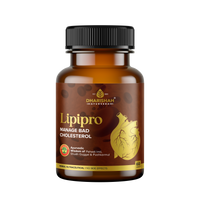High cholesterol has become a growing concern across age groups. It increases the risk of heart disease, stroke, and other metabolic issues. Modern treatments like statins help lower cholesterol but may bring side effects with long-term use.
Ayurveda offers a safer and more sustainable approach. It focuses on restoring balance, improving digestion, and cleansing the system. Ayurvedic medicine for cholesterol control aims not just to reduce numbers on a test but to strengthen your body’s natural regulation process.
Understanding Cholesterol in Ayurvedic Terms
Ayurveda describes the body through the balance of three doshas—Vata, Pitta, and Kapha. Cholesterol imbalance is mainly linked to excess Kapha and poor digestion.
Kapha imbalance leads to heaviness and sluggish metabolism.
Ama is the toxic residue formed when digestion is weak. It mixes with body fat and blocks the channels that carry nutrients.
Meda Dhatu represents the body’s fat tissue. When it becomes excessive or contaminated with Ama, cholesterol builds up in the bloodstream.
Poor Agni, or digestive fire, triggers this process. Weak digestion allows Ama to form. Over time, this Ama combines with Meda Dhatu and circulates through the body, leading to high cholesterol and vascular stiffness.
Evidence and Research
Modern research supports several Ayurvedic herbs for lipid regulation. Clinical trials show promising results.
- Guggulu (Commiphora mukul) helps lower total cholesterol and triglycerides.
- Terminalia arjuna supports heart function and improves HDL levels.
- Triphala, a mix of three fruits, enhances digestion and aids natural detoxification.
A review of herbal interventions found consistent cholesterol reduction with minimal side effects. The mechanisms include antioxidant effects, improved lipid metabolism, and reduced inflammation. These herbs support vascular flexibility and promote healthy liver function, which is central to cholesterol management.
Key Ayurvedic Herbs and Formulations for Cholesterol
Guggulu: Known as the most powerful lipid-balancing herb. It enhances fat metabolism, removes Ama, and clears channels.
Arjuna (Terminalia arjuna): Strengthens the heart muscle and improves circulation. It reduces LDL oxidation, protecting arteries from damage.
Triphala: A blend of Amla, Haritaki, and Bibhitaki. It gently cleanses the gut, supports liver function, and improves digestion.
Turmeric (Curcumin): Acts as a natural anti-inflammatory and antioxidant. It protects blood vessels and supports liver detoxification.
Garlic and Fenugreek: Help reduce triglycerides and support bile secretion, aiding fat breakdown.
Classical Ayurvedic Formulations
- Arjuna Guggulu
- Medohar Guggulu
- Guggulu Panchapala
- Triphala Churna
These formulations address root causes and help maintain healthy lipid balance when taken under medical supervision.
How Ayurvedic Treatment Works Over Time
Ayurveda works gradually. It focuses on sustainable correction rather than short-term suppression.
Phase 1: Detoxification
Cleansing therapies remove Ama and restore digestive fire. Mild herbal purgation or teas may be used to prepare the body.
Phase 2: Lipid Regulation
Once digestion is balanced, lipid-lowering herbs like Guggulu and Arjuna are introduced. These improve metabolism and tissue repair.
Phase 3: Maintenance
Rasayana herbs strengthen tissues and maintain balance. Diet, exercise, and stress control become part of daily life to prevent relapse.
This step-by-step approach ensures that cholesterol levels stay stable even after stopping medicines.
Diet and Lifestyle for Cholesterol Control
Ayurveda considers food and routine as medicine. You can achieve long-term results when you align them with your treatment.
Diet Tips
- Eat light, warm, and freshly prepared meals.
- Include whole grains, green vegetables, pulses, and fruits.
- Avoid deep-fried, refined, or cold foods.
- Use spices like turmeric, cumin, coriander, and ginger to enhance digestion.
- Limit sugar, cheese, and processed meats.
Lifestyle Practices
- Exercise regularly. Walking, yoga, and pranayama improve metabolism.
- Maintain proper sleep patterns.
- Manage stress through meditation or breathing techniques.
- Drink warm water daily to help cleanse the system.
- Perform gentle self-massage (Abhyanga) using sesame or mustard oil.
Simple routines followed consistently help stabilize cholesterol naturally.
Safety, Quality, and Choosing the Right Provider

Ayurvedic herbs are safe when taken under professional guidance. Always inform your doctor if you take prescription medicines.
Choose high-quality products from trusted brands that follow Good Manufacturing Practices (GMP). Look for heavy metal testing, ingredient transparency, and proper certifications.
Dharishah Ayurveda offers a strong commitment to purity and efficacy. Their cholesterol-supporting formulations are made from standardized herbal extracts. Each batch is tested for safety and potency. Personalized guidance is available for dosage and duration.
Integrating Ayurveda with Conventional Treatment
- Discuss with your doctor before adjusting any prescribed drugs.
- Monitor your lipid profile every three to six months.
- Gradually reduce dependence on synthetic medicines if your physician agrees.
Many people use Ayurvedic herbs to maintain results after statin withdrawal or dose reduction.
Conclusion
Ayurvedic medicine to reduce cholesterol provides a comprehensive, safe, and lasting solution. It strengthens digestion, clears toxins, and restores natural balance. Herbs like Guggulu, Arjuna, and Triphala offer proven benefits when supported by a healthy diet and lifestyle.
You can start your journey toward balanced cholesterol by consulting an Ayurvedic practitioner. Choose trusted brands like Dharishah Ayurveda that ensure quality and effectiveness. Consistency, guidance, and mindful living make a real difference in long-term cholesterol health.













